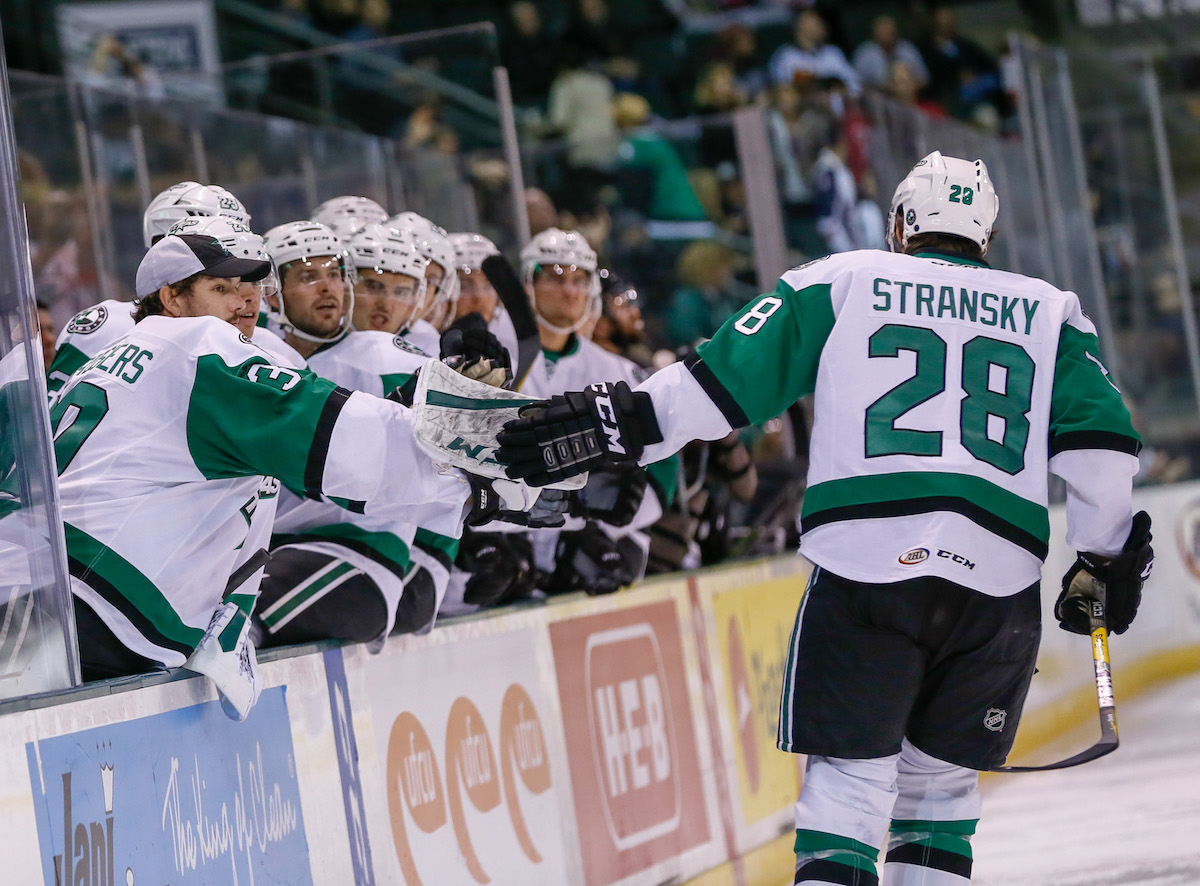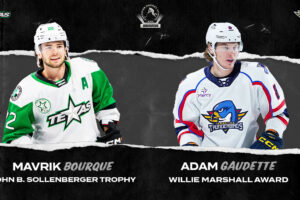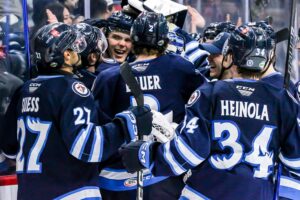By Stephen Meserve | AHL On The Beat
The injury woes of the Dallas Stars this season have been well-documented. The club has already lost 142 man-games to injury on the season.
Those injuries started in training camp, and the hits just kept on coming. Cody Eakin, Jason Spezza, Patrick Sharp, Jiri Hudler and Mattias Janmark would all drop from the lineup for various reasons. Janmark was lost for the season following a knee injury requiring season-ending surgery.
And so, in stepped the Texas Stars. Players on Texas’ opening night roster have now contributed 25 man-games to the NHL side since the start of the season.
“Your AHL team is a lifeline to your NHL team,” notes Texas Stars head coach Derek Laxdal. “They’re going to go through injuries and sicknesses. They’ll go through peaks and valleys in their play. Any time you can bring up a player to support their play, to get them through a tough stretch or tough travel, it gives them extra energy to get through the season. It’s a grind up there. Any AHL team — that’s why they’re there.”
Laxdal noticed in training camp that his players sensed there was an opportunity amid the injuries for AHL players to up their game and make it into the NHL this season.
“Right from the get-go, guys sense opportunities. When they hear of a long-term injury, they perk up a little bit and some guys pick their game up a little quicker.”
For the past two season, the Dallas Stars have hosted their training camp in the Austin suburb of Cedar Park, Texas, the home of their AHL team. Having everyone in the same place has helped to create a strong bond across the Dallas Stars, Texas Stars and the ECHL’s Idaho Steelheads.
“I’ve been here five years now, so I’ve built a lot of relationships,” said Justin Dowling, who got his first NHL game this season. “Once the season gets going, everyone splits up and goes their own ways. It’s nice when everyone comes to Austin, and you get to hang out with those guys, especially when you get called up because you’re a lot more comfortable and confident.”
Justin Dowling’s call came on October 24. In his first game against Winnipeg, he played along as he was subjected to their Dallas ritual of the solo warmup skate. First-timers are sent out for pregame warmups first in line, but the rest of the team doesn’t follow, allowing them to do a complete lap alone. Dowling was no exception.
“I knew the solo skate was coming,” said Dowling, smiling. “Lo and behold, Jamie Benn calls me up to lead the guys, and there I go on a lap by myself. You pretend like it’s not coming and act surprised when it comes.”
Gemel Smith is another player who took a solo skate this season. His first NHL game on October 22 came as a direct result of injuries. Smith found himself in an opportune position for the call-up thanks to the long-term development of his AHL coaches. Last season, Smith struggled with his overall game and found himself in the ECHL for a time.
Smith recalled, “[Being sent to the ECHL] was a wake-up call. I was immature in my game and my preparation. It helped me for the season.”
In the estimation of Coach Laxdal, both Smith and Dowling were recalled to the NHL because they were able to act as supportive players to the star-studded roster in Dallas. Laxdal, who coached the junior Edmonton Oil Kings before Texas, noted that everyone can score in the WHL. He used to instruct players there that the ones who will make the AHL or NHL rosters are the ones who can defend. Now he preaches the same message to his AHL squad.
“If I had a dollar for every time I’d said that in the last two years, I’d be a rich man!”
He continued, “Smith goes to Dallas, and he’s on the PK and on the ice in the last minute of the game. Smith doesn’t realize it, but we planted that seed with him for the past two years. That’s the message we’re trying to give them.
“Later, Smith is quoted in the paper up there saying he’s got to play a 200-foot game and play on the defensive side of the puck. Until they have the success of going up, they don’t realize what it takes to stay there.”
In addition, one of Dowling’s two points while he was in the NHL was an assist on an empty net goal, providing the value of his defensive play.
“I worked hard on being smarter in the D zone. In that game, I was playing really well in the D zone so that gave [Dallas Stars head coach Lindy Ruff] the confidence to let me go out there in the last three or four minutes.”
Laxdal was proud to see Dowling in those defensive situations for Dallas. “Last year, we hammered him on D zone coverage. He goes up and you watch him, ‘Boy, he’s supporting well. He’s underneath the puck.’”
“The seed has been planted by [former coach] Willie Desjardins and again by us so when these guys go up there, they go back to, ‘I’m here. How am I going to survive?’ It’s defensive hockey. They have to have that foundation of defensive hockey.’
It’s a tried and true formula for advancement to NHL regardless of pedigree. Radek Faksa, a first round pick in 2012, wanted “offense, offense, offense” when he first arrived, according to Laxdal. The message to Faksa was the same as the message to Dowling and Smith: “If you’re great on the faceoff circle and great on the PK, you’re going to get a chance to score.”
Faksa is now an NHL regular and falls back on those defensive skill sets honed in Cedar Park to provide value to the squad.
Laxdal added, “The NHL teams have their superstars but you have to find a way to play around them and be that supporting cast for that group. Those supporting guys can score once they develop the confidence and trust of the coaches to be put in those situation.”
No matter how well you play, being an injury call-up is a double-edged sword. You can just as quickly be back in the AHL if someone returns to good health.
“I take it as if I weren’t going to get sent down,” said Smith. “I didn’t really worry about that. I block that out. Obviously you know in the back of your head. I focused on living in the moment.”
Dowling knew as well that his time in the league may be limited by someone else’s good health returning, but he just focused on doing what he could to contribute and had his eye on the future, noting, “Play well enough to know if something happens again, you’re coming up again. Contribute and win hockey games. You don’t want to go up there and play sluggish or nervous because you might only get one chance a year.
“You want to plant a seed, so the next time there’s a chance, you’re the name in their head.”
Stephen Meserve is the editor of 100 Degree Hockey, which has covered the Texas Stars since their inaugural season.






































